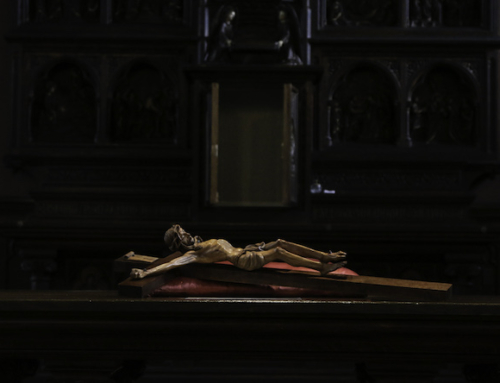If you could choose only one psalm to pray for the rest of Lent, you wouldn’t go wrong choosing Psalm 130. It is—with great competition—one of the most beautiful psalms. It is beautiful because it encapsulates any person’s prayer to God. It especially expresses what our prayers should be like during the season of Lent, this time of repentance, return to the Lord, and renewal.
This psalm is realistic. It doesn’t hide from the truth of how each of us has the urge to cry out to the Lord, from the depths of our hearts. The Psalmist manifests this as he admits: “If you, Lord, keep account of sins, Lord, who can stand?” All of us stand in need of God’s mercy, all of us need God’s grace. Lent is especially a time for realizing our need for God, through recognizing our weaknesses and failings. But the experience of need is only the beginning of this psalm, it is not the ending.
The Psalmist goes on: “With the Lord is mercy, with him is plenteous redemption.” The recognition of one’s sinfulness and insufficiency is only ever part of the story, and indeed the smaller part. The other greater part of our story is the marvelous mercy of God. No matter how Israel sins, the Psalmist trusts and affirms that God “will redeem Israel from all its sins.” What was true of Israel is true of us. God has redeemed us from our sins, and his mercy always invites us anew.
Because he knows God is merciful, the Psalmist turns completely to the Lord. “My soul looks for the Lord more than sentinels for daybreak.” In today’s world, we do not often get to experience the delight and peace that the rising of the sun is meant to bring. Imagine the loneliness and fear that would come from standing watch on a city wall through the long hours of the night, not knowing what surrounds it. Our lives often mirror this experience of waiting in the darkness. We’ve all experienced confusion concerning the past, worry about the present, and anxiety about the future. It is in such moments that we most need God’s grace to help us trust him and his loving plan for us.
The Lord’s merciful love, when it dawns on our souls and drives away the darkness of sin and the sadness of distress, is far more marvelous than any physical light that scatters shadows and warms every chill. It heals us, sets us free, and enables us truly to love him, ourselves, and all around us. God’s light and love continue to break upon us in numerous ways—in the words of Scripture, in the charity of others, in the sacrament of Confession, and above all in the Mass. All of these point to and give us a foretaste of the glory of God’s light that awaits us in the heavenly Jerusalem (Rev 22:4–5).
This Lent, commit to praying Psalm 130. Make its expressions of repentance and trust your own. Let it shape your thoughts, enlighten your eyes, and enflame your heart. And may we all become like sentinels watching for daybreak and hoping in the Lord.
✠
Image: James Tissot, The Return of the Prodigal Son







